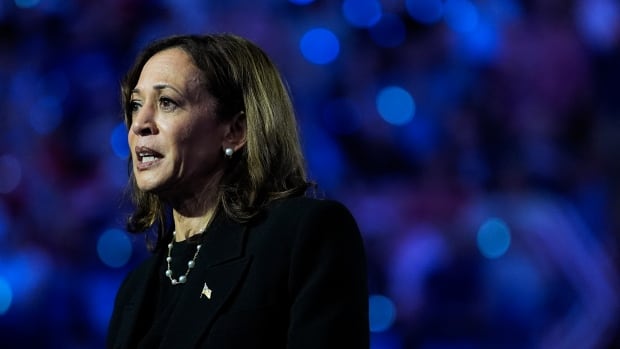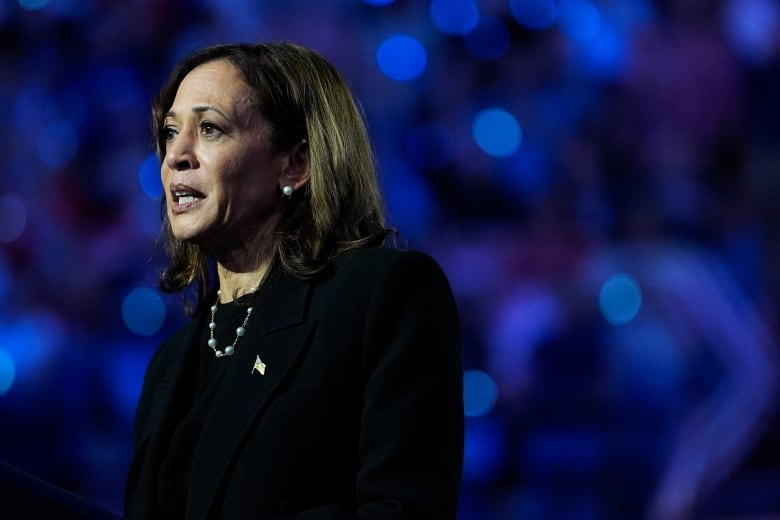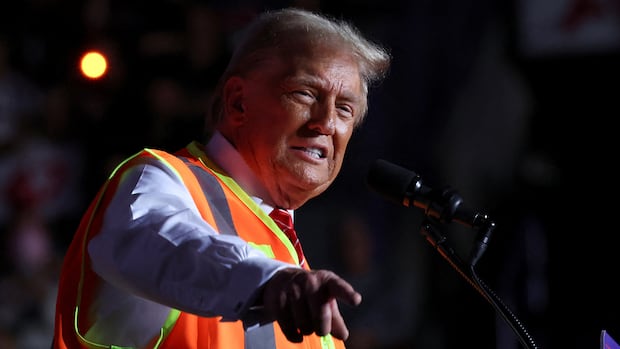
Kamala Harris said Thursday that Donald Trump’s comment about protecting women whether they “like it or not” shows the former U.S. president does not understand women’s right “to make decisions about their own lives, including their own bodies.”
“It actually is very offensive,” Democratic nominee Harris said about the remark, before she set out to spend the day campaigning in the Western battleground states of Arizona and Nevada.
“This is just the latest on a series of reveals by the former president of how he thinks about women and their agency.”
At a rally Wednesday evening near Green Bay, Wis., Republican nominee Trump told his supporters that aides had urged him to stop using the phrase because it was “inappropriate.”
He said he then told those aides, “Well, I’m going to do it whether the women like it or not. I am going to protect them.”
Trump’s remarks come as he has struggled to connect with female voters and as Harris courts women in both parties, with a message centred on freedom. She’s making the pitch that women should be free to make their own decisions about their bodies, and that if Trump is elected, more restrictions will follow.
Donald Trump is again facing backlash, this time after promising to protect women whether they ‘like it or not’ at a rally in the swing state of Wisconsin. Kamala Harris used the comment to attack Trump, saying he does not believe women should have agency over their bodies.
Trump appointed three of the justices to the U.S. Supreme Court who formed the conservative majority that overturned Roe v. Wade, which for decades had protected federal abortion rights for people across the country.
As the fallout from that 2022 decision spreads, Trump has taken to claiming at public events and in social media posts that he would “protect women,” and make sure they wouldn’t be “thinking about abortion.”
Trump and Republicans have struggled with how to talk about abortion rights, particularly as women around the nation are grappling with obtaining proper medical care because of the restrictions, whose implications go far beyond just the ability to end an unwanted pregnancy.
Trump inconsistent on abortion
Trump has given contradictory answers about his position on abortion, at some points saying that women should be punished for having them, and showcasing the justices he appointed. During his successful 2016 campaign, he told voters that if he were elected, he would appoint justices to the Supreme Court to overturn Roe v. Wade, and said he was “pro-life.”
But in recent weeks he’s promised to veto a national abortion ban, after repeatedly refusing to make such a pledge. He’s said the states should regulate care and said some laws were “too tough.”

Since 2022, the patchwork of state laws on abortion has created uneven medical care. Some women have died. Others have bled in emergency room parking lots or became critically ill from sepsis as doctors in states with strict abortion bans send them away until they are sick enough to warrant medical care. That includes those who never intended to end their pregnancies. Both infant and maternal mortality has risen.
Harris’s campaign has seized on Trump’s statements about women. In one campaign ad, a woman who became gravely ill with sepsis after a pregnancy complication stands in front of a mirror looking at a large scar on her abdomen, as audio plays of Trump’s comments about protecting women.
Harris hopes abortion will be a strong motivator for women at the ballot box.
Women outvoting men so far, firm data suggests
In early voting so far, 1.2 million more women than men have voted across the seven battleground states, according to data from analytics firm TargetSmart.
That doesn’t necessarily translate into Democratic gains. But in the 2020 presidential election, there was a nine percentage-point difference between men and women in support for Joe Biden and Kamala Harris, according to AP VoteCast, a survey of more than 110,000 voters.
The Democratic ticket was supported by 55 per cent of women and 46 per cent of men. That was essentially unchanged from the 2018 midterms, when VoteCast found a 10-point gender gap, with 58 per cent of women and 48 per cent of men backing Democrats in congressional races.
Liz Cheney, a conservative Republican who has been campaigning for Harris, has noted on the trail that ballots are secret, and suggested that Republicans who want to quietly vote against Trump can do so.
Harris has rallies scheduled Thursday in Phoenix, Reno, Nev., and Las Vegas. Meanwhile, Trump is traveling to New Mexico and Virginia in the campaign’s final days, taking a risky detour from the seven battleground states to spend time in places where Republican presidential candidates have not won in decades.
